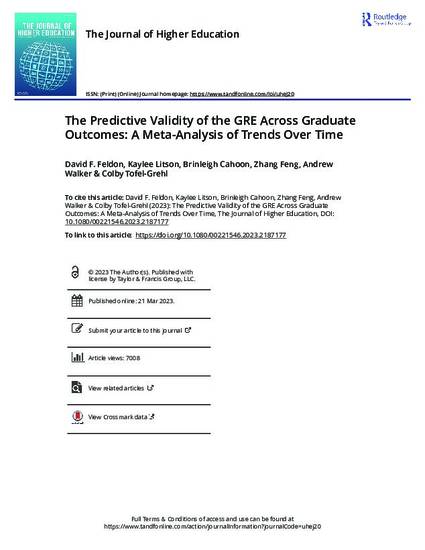
This meta-analysis assesses the predictive validity of the Graduate Record Examination (GRE) across outcome variables, including grade point average, for graduate students. In addition to aggregate effects, this paper also assessed changes in observed effects over time as related to increasing diversity in the graduate student population and as a function of gender and racial/ethnic composition of study samples. Framed using a lens of critical whiteness, this analysis examined n = 1,744 individual effects across k = 208 studies. Overall, 61.6% of reported effects were nonsignificant (i.e. no predictive value of GRE scores on student outcomes). Further, the magnitude of observed predictive relationships decreased significantly over time. The aggregate mean effect across all studies and outcomes was small, significant, and positive: GRE score predicted 2.25% of variance across measured outcomes, 4% of variance in overall GPA, and 2.56% of variance in first-year graduate GPA. Sample composition effects by race/ethnicity were notable but nonsignificant (p = .06), with increasing proportions of people of Color within a study sample associated with poorer predictive validity. Likewise, the magnitude of negative effects where lower GRE scores predicted stronger student outcomes increased from 0.16% of variance for all-white samples to 5.3% for samples comprised entirely of people of Color.
David F. Feldon https://orcid.org/0000-0003-3268-5764
Kaylee Litson https://orcid.org/0000-0003-1296-4811
Zhang Feng https://orcid.org/0000-0003-4594-2627
Andrew Walker https://orcid.org/0000-0001-8693-9921
Colby Tofel-Grehl https://orcid.org/0000-0002-4270-4060
